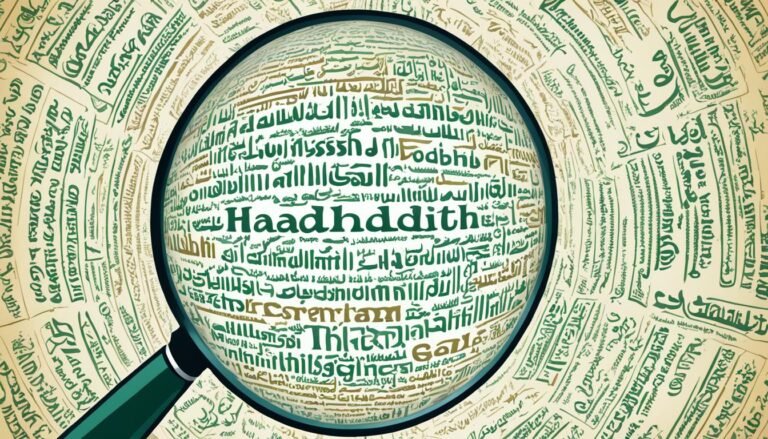Islam and Environmental Ethics: A Green Perspective
How can Islam help us create a sustainable future? The link between Islam and Environmental Ethics shows us the importance of taking care of the Earth. It also shows the deep value of nature in Islamic teachings. As we face big environmental problems, seeing how Islam promotes eco-consciousness is key.
Islamic texts have always given us rules for living sustainably. Ideas like Tauheed (the oneness of God), Khilafa (stewardship), Amanah (trust), and Mizan/Adl (balance and justice) help us understand how to care for the environment. By looking at this green view, we learn our duties as guardians of the Earth. Hazrat Ali ibn Abi-Talib taught us to use the Earth’s resources wisely without harming it.
Today, living sustainably is crucial. Recognizing the values in Islamic teachings shows us a timeless and modern way to tackle environmental issues.
Key Takeaways
- The Islamic view stresses the need to protect nature, seeing it as a sacred duty.
- Teachings from the Prophet Muhammad show us the beauty of nature and how to use its resources wisely.
- Now, Muslim business leaders are making eco-friendly products to lessen our impact on the planet.
- Islamic ethics match green chemistry principles, supporting sustainable ways of living.
- Being aware and taking steps like recycling and reducing waste are crucial in fighting environmental issues.
Understanding Environmental Ethics in Islam
Environmental stewardship in Islam shows how deeply we are responsible for taking care of the Earth. It’s not just about being a guardian; it’s a moral duty to keep things sustainable. The Qur’an and the Sunnah guide us, teaching us to live ethically and respect nature.
The importance of environmental stewardship in Islamic teachings
At the heart of Islamic beliefs is the idea of taking care of the environment. It teaches us to be moderate, avoid waste, and respect all life. The Qur’an tells us to use resources wisely and save them for the future. This way, we protect the planet for everyone.
A study by the Center for International Earth Science Information Network found a link between religion and caring for the environment. It shows that less religious people might harm the environment more.
Core ethical principles derived from the Qur’an and Sunnah
Islamic teachings give us clear ethical rules for living. They talk about justice, respect, and using things wisely. For example, even in simple acts like washing, we’re taught not to waste water.
These principles match the UN’s goals for a better world. They aim to end poverty, use resources well, and support sustainable farming. Seminars on food and the environment show how these teachings help us solve today’s problems.
| Principle | Description | Example from Teachings |
|---|---|---|
| Justice | Fair treatment of all beings and resources. | Qur’anic injunction against waste. |
| Moderation | Encouragement of balanced consumption practices. | Hadith promoting careful water use during ablutions. |
| Respect for Life | Recognition of the intrinsic value of all creatures. | Teachings that safeguard biodiversity. |
| Rationalization | Thoughtful and deliberate use of resources. | Discussion on sustainable food practices in seminars. |
Islam and Environmental Ethics: A Green Perspective
Islam teaches us to care for the environment as a sacred trust. This belief makes us want to protect it. It shows us that our actions affect the planet and its future.
Islam teaches us to be good stewards of the Earth. It tells us to live in balance with nature. The Prophet Muhammad also taught us that being good is very important. He said that having good character is one of the heaviest things on the scale.
Muslims are encouraged to take action against climate change. They can do this by living sustainably, helping in community projects, and spreading awareness about environmental issues.
Books like “Islamic Environmental Ethics, Law, and Society” talk about the importance of ethics in taking care of the environment. They say it’s not just a suggestion, but a key part of being a Muslim. Muslims are working to solve environmental problems with faith as their guide.
| Dimension | Islamic Teaching | Ecological Responsibility |
|---|---|---|
| Faith | Sacred trust of creation | Preservation of nature as a divine duty |
| Morality | Good character and ethical conduct | Alignment of personal actions with environmental ethics |
| Community | Collective responsibility | Engagement in sustainable initiatives |
Muslims are at a critical point, balancing their faith with action to protect the environment. By linking faith and ecology, we see a green perspective as essential in today’s world.
Historical Context of Islamic Environmental Teachings
The history of environmental teachings in Islam shows a deep respect for nature. Ancient Muslim communities used sustainable farming and saved water. These early practices set the stage for today’s Islamic environmental efforts.
Ecosystems and sustainable practices in ancient Muslim societies
Long ago, Muslim communities knew how to live in harmony with nature. They used:
- Efficient irrigation through qanats
- Application of crop rotation
- Utilization of organic fertilizers
These methods show a deep care for the planet, similar to today’s green ideals. The Quran teaches us to be good stewards of the Earth, as we are all Khālifah.
The role of Islamic scholars in promoting environmental awareness
Islamic scholars have been key in teaching us about caring for the environment. Scholars like Seyyed Hossein Nasr started the conversation in the 1960s. Later, Mawil Izzi Dien and Fazlun Khalid built on this work in the 1980s.
They talked about the importance of balance, or mizan, in Islam. Scholars used Islamic law to tackle issues like pollution. The Al Mizan covenant shows how scholars are working together to protect the environment.
This ongoing effort is vital as Muslims face today’s environmental challenges. The 2015 Islamic declaration on climate change from Istanbul is a key example.
Learning from these teachings helps us see how Islam has always valued taking care of the planet. This shows the long history of Muslims caring for the environment.
| Period | Key Contributors | Cultural Practices | Environmental Concepts |
|---|---|---|---|
| Ancient Times | N/A | Qanats, crop rotation | Khālifah, mizan |
| 1960s | Seyyed Hossein Nasr | N/A | Environmental ethics |
| 1980s | Mawil Izzi Dien, Fazlun Khalid | N/A | Qiyas, Al Mizan |
| 2015 | N/A | Climate change declaration | Green JIZ model |
Modern Challenges to Environmental Sustainability
Muslim-majority countries face big threats to their environment. Climate change hits hard in places prone to bad weather, sea level rise, and scarce resources. This calls for action based on Islamic values that teach us to care for the earth.
Impact of climate change on Muslim-majority countries
Countries like Pakistan, Afghanistan, and Somalia suffer a lot from climate change. Bad weather patterns hurt farming and water supplies, making things worse for people. This shows we’re not taking care of the earth like we should.
People who depend on nature are hit the hardest. This shows we’re not keeping the balance God set for us. We need to see our role as guardians of the earth, as given by Allah.
The consequences of urbanization on natural resources
Urban growth brings big problems for nature. Cities make more waste and pollution, which harms clean water, soil, and wildlife. In many places, more industry and bad farming use up resources fast.
Using water wisely and rotating crops can help. These methods protect resources and follow Islamic teachings on being careful with what we use.
Getting communities involved and teaching them about Islamic views on the environment is key. Programs that mix ecology with Islamic values are starting up worldwide. They show a new generation’s commitment to solving environmental issues with faith. This is both a spiritual duty and a need to tackle the big environmental problems these communities face.
| Country | Climate Change Impact | Urbanization Consequences |
|---|---|---|
| Pakistan | Severe flooding, agricultural decline | Increased waste and pollution |
| Afghanistan | Water scarcity, sustainable agricultural practices disrupted | Loss of arable land, deforestation |
| Somalia | Drought, food insecurity | Overpopulation, resource depletion |
| Nigeria | Desertification, agricultural challenges | Urban crowding, biodiversity loss |
| Indonesia | Rising sea levels, flooding risks | Pollution, habitat destruction |
Islamic Perspectives on Climate Change
Islamic teachings deeply influence how we see climate change. They stress our duty to take care of the planet. This belief comes from the Qur’an and Sunnah, calling us to work together to protect the environment.
Understanding humanity’s role as vicegerents on Earth
In Islam, humans are seen as guardians of Earth. This means we must take care of the planet. The Qur’an mentions caring for Earth in about 200 verses.
This shows us that everything in creation is connected. Each part has a role, which means we must live sustainably.
Fatwas addressing environmental issues
Fatwas are Islamic rulings on how to act responsibly towards nature. In 2014, a fatwa from Indonesia urged Muslims to save endangered animals. The Alliance for Religions and Conservation also worked with Islamic scholars in Tanzania to stop harmful fishing.
This shows how Islam aims for environmental justice. It’s becoming more popular in Muslim communities around the world.
| Country | Rank in Pollution | Greenhouse Gas Emission Rank | Estimated Climate Refugees by 2050 |
|---|---|---|---|
| Bangladesh | 1 | N/A | 1 in 7 people |
| Pakistan | 2 | N/A | N/A |
| Indonesia | 3 | 5th largest emitter | N/A |
Together, we’re taking action based on Islam’s view on climate change. This shows our ethical commitment to the planet. It’s about living in a way that respects the natural world God created.
Eco-Friendly Practices in Islam
Islam teaches us to care for the environment through its teachings and rituals. These actions help us connect with nature and follow today’s environmental values. By planting trees, managing waste well, and saving water, we show our love for nature, just as Islam teaches.
Rituals that promote environmental consciousness
Many Islamic rituals help us feel close to the earth. For example, we’re taught to respect the Earth as a gift from God. These rituals come from the Quran, which tells us to live sustainably as a religious duty.
By helping our communities or using things wisely, we follow important Islamic values. These values include believing in one God and being good stewards of the earth.
Examples of conservation in Islamic traditions
Islamic traditions show us how important it is to protect the environment. Studies show that most Hadiths talk about saving the environment. This shows us the strong values that guide our actions every day.
The Prophet Muhammad taught us not to waste things, showing the need for moderation. Today, some Muslims are making eco-friendly products, like the ABDEEZ Portable Bidet. This shows how Islamic values can guide us in making a difference.
These examples show that Muslims are called to work for a sustainable future. They aim to live in harmony with nature, following the teachings that bring us closer to God and the earth.
Islamic Environmental Activism: A Growing Movement
Islamic environmental activism is growing fast. Muslim communities are leading the way in green initiatives. These efforts tackle local and global environmental issues. They show how faith and caring for the environment can work together.
Case studies of Muslim communities leading green initiatives
In recent years, Muslim communities have started many projects focused on sustainability. For example, the Bumi Langit permaculture farm in Indonesia is all about sustainable farming. It began in 2006 and teaches local communities about taking care of the environment.
Another great example is the Amumarta Islamic boarding school in Yogyakarta. It’s working on making biofuel from the Qur’an, using the nyamplung tree. This shows how Islamic teachings can lead to big changes in how we use energy.
The influence of Islamic NGOs on environmental policy
Islamic NGOs are playing a big role in pushing for green policies, especially in places facing big environmental problems. Fazlun Khalid, a key figure in Islamic environmental work, started the Islamic Foundation for Ecology and Environmental Sciences (IFEES) in 1994. His work has helped start projects in Tanzania, Saudi Arabia, and Madagascar.
Groups like NU and Muhammadiyah in Indonesia have also been fighting for the environment since the 1980s. They have departments for protecting the environment and run programs like eco-jihad and reforestation. These efforts are getting more attention and are making a big difference.
| Initiative | Location | Focus Area |
|---|---|---|
| Bumi Langit Permaculture Farm | Indonesia | Sustainable agriculture |
| Amumarta Islamic Boarding School | Yogyakarta, Indonesia | Biofuel production |
| IFEES (Islamic Foundation for Ecology and Environmental Sciences) | Various (Global) | Environmental advocacy |
| NU and Muhammadiyah | Indonesia | Environmental protection |
These Muslim communities and groups are showing us a new path towards caring for the environment. They prove that taking care of nature is a key part of Islam. Their work is making a big difference and inspiring others to act.
Eco-Consciousness in Islam: The Way Forward
Fostering eco-consciousness in Islam lets believers live sustainably with faith. It encourages individuals and communities to take care of the environment. This builds a strong link between Islamic teachings and today’s green practices. It helps both people and the planet.
Encouraging sustainable lifestyles among believers
To promote sustainable living among Muslims, we can take steps. Educational programs teach eco-awareness in Islam. They include workshops, seminars, and outreach to highlight the importance of caring for the earth as an Islamic value. Mixing local traditions with new green strategies can make people more committed to living sustainably.
Bridging traditional practices with modern sustainability
Linking old ways with new green ideas creates a balanced approach. Ancient wisdom, in line with Islamic teachings, offers insights on being eco-friendly. Rituals and concepts like using natural resources wisely and saving the environment connect the past and present. By keeping traditions while adapting to today, Muslims can build a strong eco-aware culture.
| Initiative Type | Description | Example Activities |
|---|---|---|
| Education | Workshops and seminars promoting eco-consciousness in Islam. | Community discussions, lecture series. |
| Community Action | Local projects focusing on sustainable living. | Community gardens, recycling programs. |
| Traditional Practices | Incorporating historical ecological wisdom. | Restoration of local ecosystems, traditional farming. |
| Green Technology | Utilizing modern technology for sustainable solutions. | Installation of solar panels, efficient water systems. |
Green Initiatives in Muslim Communities
In recent years, Muslim communities have taken bold steps towards environmental sustainability. These efforts show a strong link to Islamic values. They lead the way with community-led projects. People come together to protect their environment and share eco-friendly knowledge and practices.
Community-led projects promoting sustainability
Many projects in Muslim communities show how group actions can make a big difference. For example, community gardens and waste reduction campaigns are great examples. They blend eco-friendly actions with Islamic teachings:
- Community Gardens: These spaces grow fresh food and teach sustainable farming.
- Waste Reduction Campaigns: Recycling and composting help cut down on landfill waste.
- Educational Workshops: These workshops teach about climate issues and green living.
Lessons learned from successful green programs
Projects have taught us important lessons that other groups can use. Key takeaways include:
| Project Type | Key Lesson | Community Benefit |
|---|---|---|
| Garden Initiatives | Working with local schools boosts community involvement. | Stronger community ties through shared projects. |
| Recycling Programs | Using social media spreads the word well. | More young people join in. |
| Workshops | Adding Islamic teachings makes people more committed. | People are more dedicated to living sustainably. |
Conclusion
Islam and environmental ethics work together to show how believers can help solve ecological problems. They form a strong plan that teaches us to take care of the Earth. This belief is that our success and survival depend on living in harmony with nature.
Islamic teachings have led communities to use sustainable practices for a long time. This has created a deep sense of responsibility towards nature. It’s more than just dealing with today’s environmental issues.
In places like the Eastern Mediterranean, religion has a big impact. When Muslims follow their faith, they tend to act more environmentally friendly. Programs in Yemen and Zanzibar show how using religious views can make a big difference.
These examples show how Islam can lead to a greener future in Muslim societies. This can greatly help the whole world.
As we face big environmental challenges, Muslims need to use their deep spiritual roots. By living a life focused on saving the planet, Muslims can make a big difference. Islam and environmental ethics offer a plan for a balanced and healthy Earth. This plan meets our current needs and looks towards the future.
Source Links
- The Green Deen: Islam’s Teachings on Environmental Protection
- p16-25Bennett.vp
- Islam’s Perspective on Environmental Sustainability: A Conceptual Analysis
- Yale Forum on Religion and Ecology
- Islam and Environmental Ethics
- When the Earth Speaks Against Us: Environmental Ethics in Islam | Yaqeen Institute for Islamic Research
- Islamic environmentalism
- How Islam can represent a model for environmental stewardship
- Environmental Sustainability Through the Lens of Islamic Ethics – Tazkiyah
- Interview with eco-Islam scholar and 11 books for sustainable Muslims
- THE ROLE OF ISLAMIC ENVIRONMENTAL ETHICS IN THE ALLEVIATION OF CLIMATE CHALLENGES AND THE PRESERVATION OF ECOSYSTEM
- What does Islam say about climate change and climate action?
- An Islamic Perspective on Ecology and Sustainability
- Environmentalism and the Muslim World
- Environmental Sustainability in Islam | EcoMENA
- The Green Deen: Islam’s Teachings on Environmental Protection
- Islam and Ecological Sustainability: An Exploration into Prophet’s Perspective on Environment
- Fazlun Khalid: Environmentalism Is Intrinsic To Islam
- ‘Green Islam’: Islamic environmentalism in Indonesia – New Mandala
- Microsoft Word – islam.doc
- American Journal of Islam and Society
- What the Quran Says about Environmental Activism
- PresentationsBook







